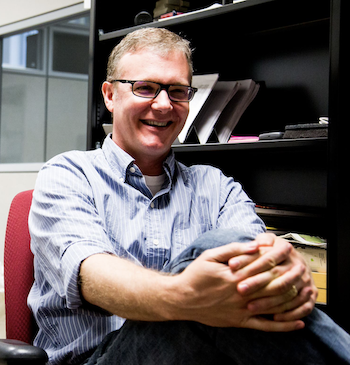OSG David Swanson Award

The OSG David Swanson Award was established to honor our late colleague, David Swanson. David contributed to campus research across the country, through the advancement of distributed high-throughput computing (dHTC) and the Open Science Grid (OSG).
“David was the founding director of the Holland Computing Center at the University of Nebraska–Lincoln and a tireless advocate for the OSG,” said Brian Bockelman, who David mentored. “Through his leadership, Nebraska went from simple ‘users’ of the OSG to having team members become part of the OSG management. David himself ultimately went on to become the OSG Council Chair in 2016 and helped steer the OSG through his calm, steady influence. Beyond his formal appointments, he was a close friend and mentor to many in the OSG community and always available to provide well-needed insight and thoughts to others.”
David passed away in an accident in fall 2019. In his memory the award is bestowed annually upon one or more former students of the OSG User School who have subsequently achieved significant dHTC-enabled research outcomes, and covers the recipient’s costs of attending the OSG All-Hands Meeting to present their work.
Award Recipients
- Connor Natzke, Colorado School of Mines — awarded and presented in 2022
- Nicholas Cooley, University of Pittsburgh — awarded and presented in 2021
- Zhonggang (John) Li, University of Wisconsin–Madison — awarded in 2020 and presented in 2021
- Anirvan Shukla, University of Hawaiʻi at Mānoa — awarded and presented in 2020
In March 2021, two David Swanson Award winners presented: John Li, a 2020 award recipient, who was unavailable to speak when the All-Hands Meeting was rescheduled from March to September 2020 due to the pandemic, and this year's 2021 recipient, Nicholas Cooley.
Connor Natzke, the 2022 David Swanson Award recipient, was a Ph.D. student from Colorado School of Mines who attended the 2019 OSG School. He almost immediately applied the lessons learned from the School to an OSG Access Point for his research in nuclear structure. Connor spoke about using high throughput computing to decrease the time required for mapping data correction factors for a gamma-ray detector array. This 6-month simulation campaign used over 15 years of computing time.
John Li, of the University of Wisconsin–Madison. attended the OSG User School in 2019 and quickly accelerated in his use of high throughput computing, whether running via a campus access point or on the Open Science Pool via an OSG Connect access point. John spoke about his work using data mining in genomics by high-throughput computing and noted that high-throughput computing saves significant computation time and projects that would have taken 2–3 years were completed in 1–2 weeks.
Nick Cooley, 2021 recipient of the David Swanson Award, attended the OSG User School in 2018. Since that time, Nick and his group at the University of Pittsburgh have undertaken a number of projects benefiting from dHTC and OSG capabilities, with more than 2 million hours of compute usage on the Open Science Pool in the last year. Nick discussed his work in computational biology on OSG.
Anirvan Shukla, a 2020 award recipient and 2016 User School participant, was a graduate student in the Department of Physics, University of Hawaiʻi at Mānoa and at the September 2020 All-Hands Meeting spoke about “Antimatter: Using High Throughput Computing to Study Very Rare Processes.”